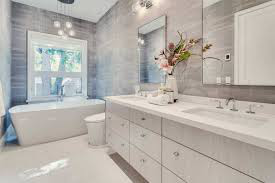Bathroom Renovation Contractors: Expert Solutions for Your Home Transformation

Choosing the right bathroom renovation contractor is crucial for transforming a tired space into a functional and stylish oasis. With the right expertise and experience, a contractor can turn a vision into reality, ensuring that every detail aligns with the homeowner’s preferences and budget. Renovating a bathroom not only enhances the aesthetic appeal but also increases property value.
With numerous contractors specializing in bathroom renovations, it’s important to understand how to select the best one. Homeowners should consider factors such as past work, client reviews, and the contractor's familiarity with current trends and materials. Investing time in this research can lead to a smoother renovation process and a more satisfying end result.
With the right contractor, a bathroom renovation can be a seamless experience. This investment pays off in both functionality and style, making it essential to find qualified professionals who understand the unique requirements of each project. Engaging with experienced bathroom renovation contractors can help ensure that every aspect of the renovation is handled with care and expertise.
Choosing the Right Contractor
Selecting a bathroom renovation contractor is crucial to ensure a successful project. Key aspects include assessing qualifications, understanding licensing requirements, and evaluating customer feedback.
Assessing Qualifications and Experience
When choosing a contractor, reviewing their qualifications and experience is essential. Look for professionals with a background in bathroom renovations specifically, as this ensures familiarity with typical challenges and designs.
Verify their expertise by asking about past projects and requesting portfolios. An experienced contractor should showcase a range of completed renovations, demonstrating their versatility and skill set.
Also, inquire about their team. A qualified labor force can significantly impact the outcome. Furthermore, check how long the contractor has been in business. Longevity often correlates with reliability and a solid reputation.
Understanding Licensing and Insurance
Licensing and insurance are fundamental elements when hiring a contractor. Each state has specific licensing requirements that contractors must meet to operate legally.
Ask to see the contractor's license to confirm it’s valid and up-to-date. This can protect the homeowner from legal issues during the renovation. Insurance is another critical factor. A reputable contractor should carry both liability insurance and worker’s compensation.
Liability insurance protects you from financial loss if damage occurs during the project. Worker’s compensation ensures that you are not liable for injuries sustained by the contractor’s employees on your property. Always request proof of these documents.
Evaluating Reviews and References
Customer reviews and references provide valuable insight into a contractor's reliability and quality of work. Start by researching online reviews on platforms like Google, Yelp, or Angie's List.
Look for contractors with a consistent pattern of positive feedback. Pay attention to comments about punctuality, communication, and the quality of workmanship.
Additionally, ask the contractor directly for references from past clients. Contact these individuals to gain firsthand knowledge about their experiences. Inquire about the project's adherence to budget, timeline, and overall satisfaction. A contractor willing to provide references demonstrates confidence in their work.
Planning Your Bathroom Renovation
Effective bathroom renovation requires careful planning. This includes setting a realistic budget, understanding design trends, and selecting the right materials and fixtures.
Setting a Budget
The first step in planning a bathroom renovation is establishing a budget. Homeowners should consider all potential costs, including materials, labor, and permits. A detailed breakdown can be useful.
A common rule is to allocate about 10-15% of the home's value for bathroom renovations.
Key expenses include:
- Labor costs: Typically account for 20-35% of the total budget.
- Materials: Surfaces, fixtures, and appliances can vary widely in price.
- Unexpected costs: Set aside an extra 10-20% for unforeseen issues.
Clarity in budgeting helps homeowners prioritize their desires effectively.
Design Considerations and Trends
When designing a bathroom, it's essential to consider both functionality and aesthetics. Current trends include open-concept layouts, freestanding tubs, and smart technology integrations.
Color schemes also play a critical role. Popular choices are neutral tones paired with bold accents.
Design elements to consider:
- Lighting: Layered lighting enhances both ambiance and utility.
- Storage solutions: Built-in shelves and clever cabinetry maximize space.
- Sustainability: Eco-friendly fixtures and materials are increasingly sought after.
Selecting a cohesive theme enhances the bathroom's overall appeal and functionality.
Selecting Materials and Fixtures
The choice of materials and fixtures can dramatically influence the bathroom’s appearance and longevity. Homeowners should focus on durability and maintenance.
Important considerations include:
- Countertops: Materials like quartz and granite provide a balance of beauty and durability.
- Flooring: Porcelain or ceramic tiles offer water resistance and easy cleaning.
- Fixtures: Investing in high-quality faucets and hardware ensures they withstand daily use.
Evaluating the maintenance required for each material helps avoid future issues. Prioritizing quality over cost can lead to satisfying long-term results.